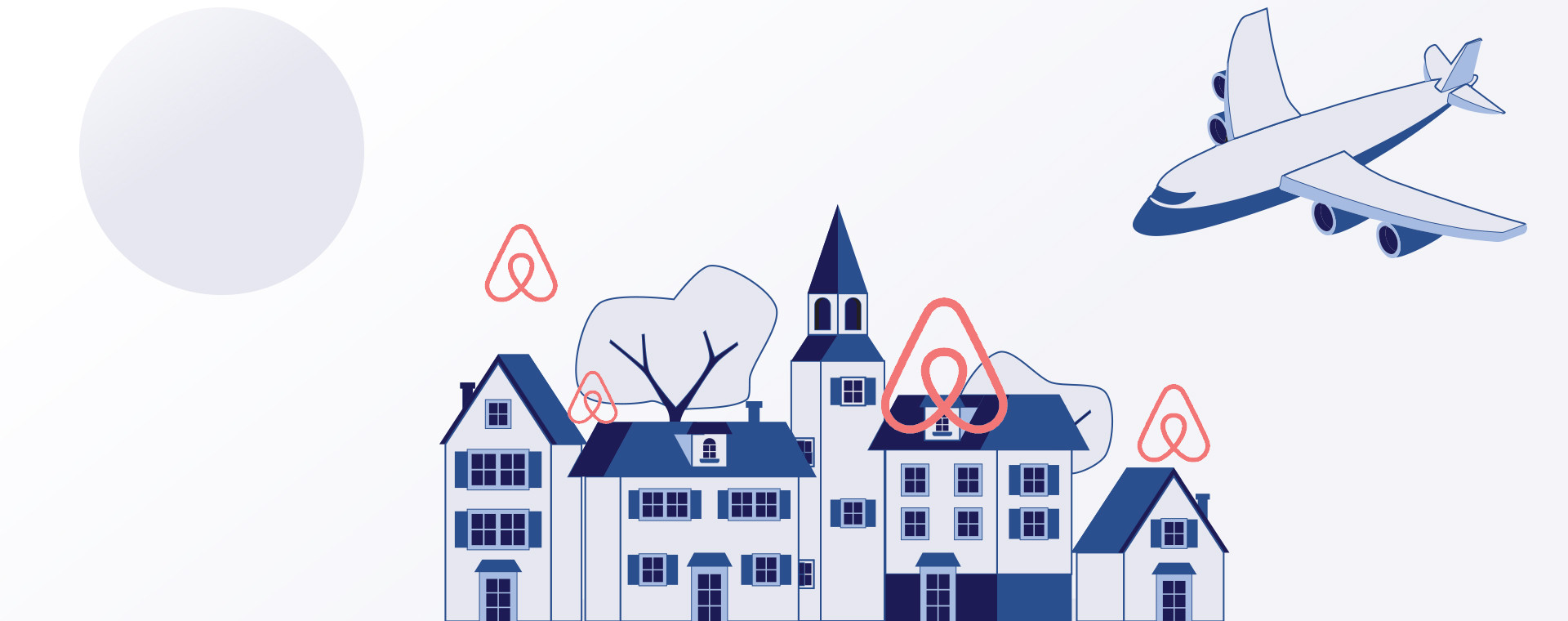
Be our guest: a new era for Pakistan’s hospitality industry
It took the pandemic for the sector to finally begin adopting new web-based tools
No one can deny the regrettable fact that technology adoption is still at a nascent stage in Pakistan but thanks to the pandemic, the process of digitalisation has accelerated in the country. A lesser known fact is that now, technology has begun disrupting the traditional hospitality industry of Pakistan.
Lately, mobile applications specialising in lodging and boarding, homestays for vacation rentals, and tourism activities have gained pace in Pakistan and listings on the applications are on an uptrend.
Just like ride hailing companies and online delivery services, these applications connect hosts (home owners willing to offer a room or whole property for lodging and boarding of customers) and consumers (primarily vacationers). Owing to drop in bookings during the pandemic, many hotel owners were encouraged to list vacant rooms on the application.
In particular, one enterprise that stands out in this regard is Airbnb, which is witnessing a lofty growth in the number of hosts. As a global giant in digital hospitality solutions, the company is trusted by customers as well which bodes well for the application. Leading competitors of the application are Vrbo, Booking.com, The Plum Guide, Agoda Homes and Homestay.
Silent entry in Pakistan
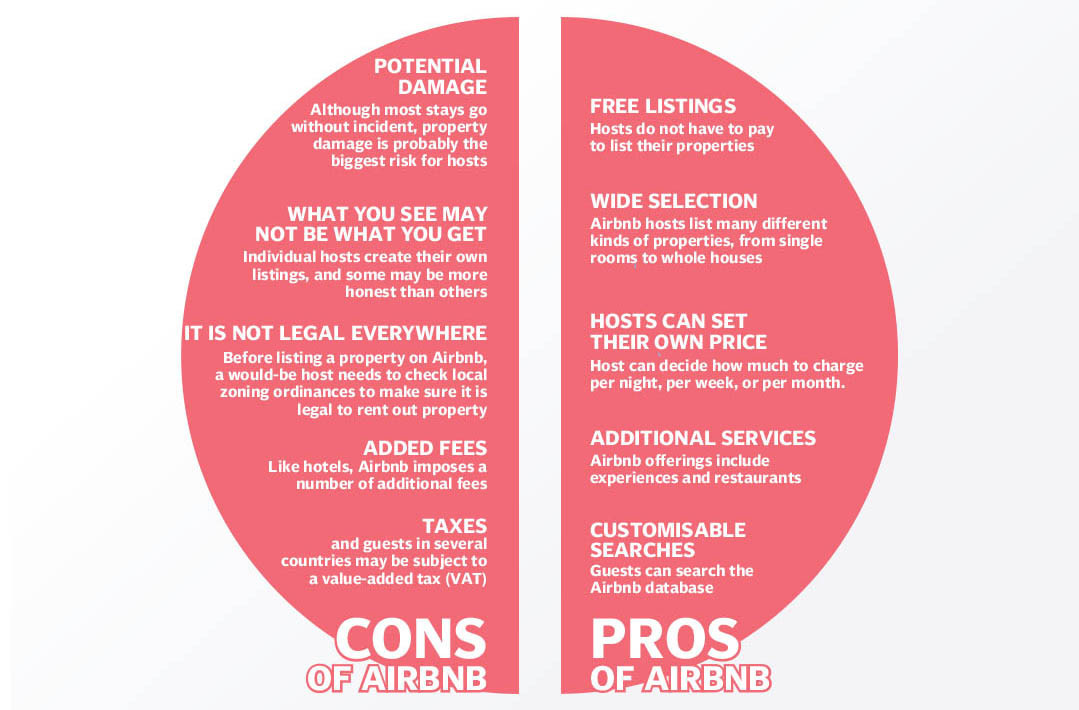
AirDNA Personal Relations Associate Madeleine Parkin told The Express Tribune that “taking a quick look at the figures, there has been huge growth in the short-term rental market in Pakistan.”
Across the country, in December 2021, there were 128% more listings available than in December 2019.
AirDNA which is a provider of data and analytics for short-term rental industry
“We only have three areas mapped in our system, but the national total includes all properties in the country, despite this,” she said.
According to her, Punjab had 1,705 listings on Airbnb in December 2021 which was 140% than December 2019’s figure.
Moreover, Islamabad’s listings witnessed 148% growth on a year-on-year basis and stood at 1,381 last month.
Sindh lagged behind in the number of listings with just 515 spots in December 2021 however it still witnessed a 79% year-on-year growth.
In terms of demand in Pakistan, there has also been an increase from 2019, with 67% more nights stayed in December 2021 than December 2019. However, in the high season, the demand was only around the same levels as in the summer of 2019, with only a 3% increase in August.
“In comparison, the US, which has the most listings of any country in the world at 1.14 million, actually lost 4% of its listings from December 2019 to December 2021,” she detailed. “However, there is strong variance in destination types, with large cities losing the most of their supply against small cities and rural destinations, which have increased their supply, along with their demand.”
Despite having the least amount of listings, Sindh excelled in average occupancy rate, average earnings and average occupancy.
Data from AirDNA showed that the average daily rate in Sindh for an Airbnb spot stood at Rs9,622 against Rs7,211 in Punjab and Rs6,112 in Islamabad Capital Territory.
Similarly, average occupancy in Sindh and Islamabad amounted to 23% against 18% in Punjab.
Finally, the average revenue earned by an Airbnb listing owner is Karachi amounted to a lofty Rs49,500 compared to Rs35,300 in Punjab and Rs35,800 in Islamabad.
Local hosts
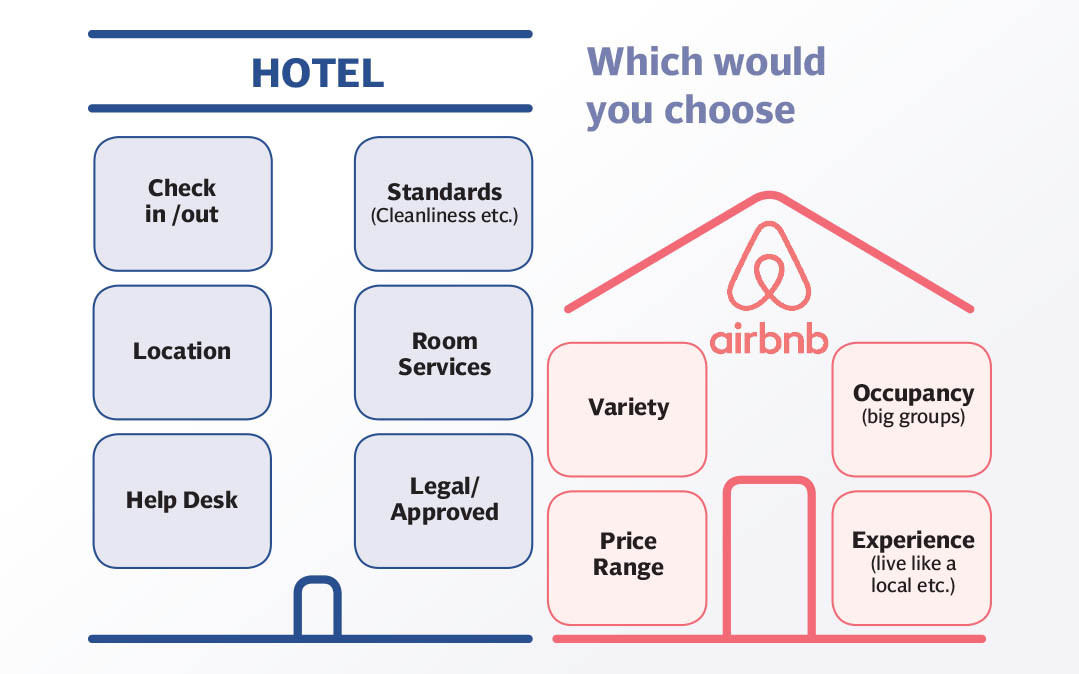
Ali A Awan, an overseas Pakistan who has listed his local home on Airbnb, told The Express Tribune that he started hosting in November 2017.
His listing is located in outskirts of Lahore and the average nightly rent is around $50. It also varies on number of days guests want to stay, he said.
Bookings vary from month to month. On average, he shared that his listing remained booked for about 15 - 20 days in a month.
“Initially, we were little susceptible about allowing unknown people in our house, but after some deliberations we listed portion of our house on Airbnb. We prefer families and now it is good to know that many families are preferring our listing as well,” he said.
Detailing his motivation to list his house on the application, he elaborated that he possessed years of experience working in the hospitality industry. He added that he had worked in the motel industry in US and his father was also possessed excellent experience of working in hotel and motel industry in US.
He lamented that Pakistan’s motel industry was not well established.
The difference between a motel and hotel is that the former has less amenities and facilities than a hotel. Moreover, hotels are tall buildings comprising multiple floors however motels are only one or two storeys long therefore, most of the listings on Airbnb can qualify as guest houses or motels.
“We always wanted to run an international standard motel in Pakistan but it is not very feasible,” he said. “The Airbnb application provided us the opportunity to list portion of our house for short-term rental and provide hospitality services to guests from all over the world. The best part of it is meeting people from across the globe.”
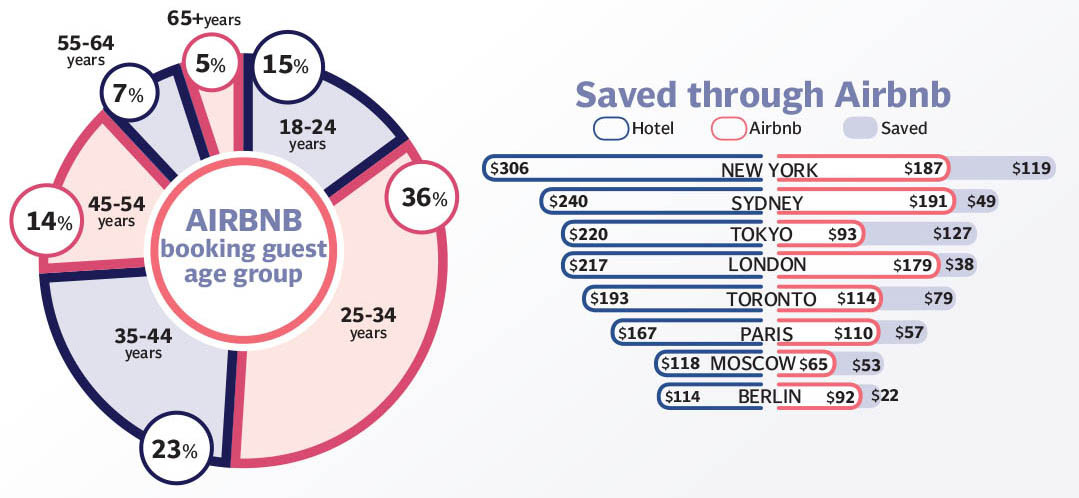
He stated that the application offered the status of superhosts who are very experienced and this status is achieved after the receives high ratings and reviews from at least 10 guests in a three months period.
Discussing official launch of Airbnb in Pakistan, he said it was much needed because it can list prices in the local currency and enhance the chances of bookings from the local people.
“Airbnb is a growing market in Pakistan. In fact, 90% of Airbnb guest are Pakistanis living in Europe and America who come to visit family. Local people are slowly getting to know about Airbnb and this is encouraging,” he said
Elaborating his experience, he noted that it had been excellent so far given that most of the guest are well behaved, clean and family oriented.
“They respect the house rules and we do our best to give them a great stay,” he said. “We occasionally host foreign tourists from all around the world. Most of them our tourists are from Sweden, Austria and UK.”
According to him, Airbnb had opened doors for foreign tourist who would not have thought about touring Pakistan.
It has provided a communication platform which creates confidence and trust between host and guests, he concluded.
Side income
Saeed Altaf, another host from Karachi stated that he listed his home for rent on Airbnb because there was too much excess capacity.
“My children live abroad and it used to be me alone in a two-storey, six bedroom home. One day, my son came up with an idea to list the top floor of the house on the application to give me some kind of a pass time,” he said. “Now, we have an influx of guests every month and the income is substantial too.”
Talking about the hidden costs, he said that he had to get the portion thoroughly cleaned everytime guests left and before new ones moved in.
He has also hired two workers to aid him in swiftly running the rental business.
According to him, the application is easy to use and payment is received swiftly.
Presently, the application has not officially launched in Pakistan therefore the mode of payment is in dollars which bodes well for Altaf.
He elaborated that other than aiding in cleaning the place, one of his worker is available to act as driver for the guests while the second one helps in assisting the elderly guests.
“Both workers are largely happy because they get a lot of off days when bookings are empty and such a benefit is not possible in a regular job,” he said.
Talking about the investment made prior to listing, he remarked that he had to install a separate TV, wi-fi, air conditioner, refrigerator and set up a makeshift kitchen to give the guests ‘everything under one roof.’
He termed it a good opportunity particularly for retired homeowners in Pakistan because the it took less effort and earning was good.
Sameer Khan has turned five of his guesthouses across Pakistan into rental spaces. He recalled gaining the hefty inheritance and paying wear and tear for year without living in them.
“At many times, I considered selling these five properties because there were a useless expense. One day I came to know about Airbnb and the idea to list on it stuck me,” he said. “Initially I listed the most lucrative of my holdings on the application to check the experience. Within months, it began to fetch ample amount of money.”
From private job to business owner
Khan has hired 15 people (three for each holding) to assist the guests.
“Being a private employee, I never thought I would be creating jobs for unemployed workers but technology has changed that,” he cherished.
According to him, the wear and tear of his rental spaces was a fraction of his revenue and even after paying all the workers, he is left with a high substantial profit.
He noted that his property from Karachi fetched the highest returns due to a host of factors. The primary reason is its location because it is facing the sea.
Foreigners enjoy such a view and this is one of the reasons why they are ready to pay a good rate as rent.
Moreover, he cited that Karachi had dearth of hotels compared to northern areas. “There are many areas of Karachi that lack decent hotels. Take Gulshan and North Nazimabad for example. There is not a single hotel in these areas and Airbnb spots are thriving in these places,” he elaborated. “There are people who have a particular preference of area and when they find no hotels there, they look for alternate options including Airbnb.” He was of the view that such people would pay a high cost for a low-end settlement in their area of preference than to live at a scenic place such as sea view.
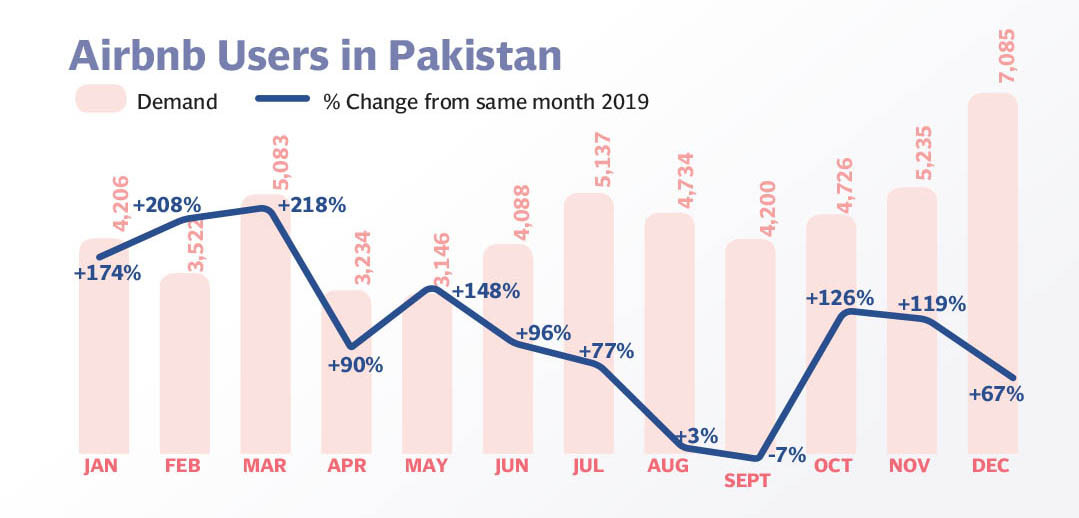
This is a flaw in the city and the government should atleast make two to three hotels per area to facilitate the public.
The official cherished that following improvement in the law and order situation in the country, tourism had revived and this fuelled earnings from Airbnb.
Almost every single guest is a tourist or overseas Pakistani visiting the country for diverse reasons, Khan pointed out.
Talking about the benefit of the service, he said that the biggest pull factor was the tax free income.
“Digital income is yet to be taxed in Pakistan so for now, I am enjoying tax free income,” he said. “Although if someday the government sets up a mechanism to tax such income, I would happily pay it but for now it is one factor that drove me to the service.”
Moreover, he cherished that he could take holidays anytime and delist the portion from the application anytime he wanted. He recalled that a few relatives stayed in his listing in Lahore two to three months ago so he removed it from Airbnb for some days.
He also stated that with this service, he was able to earn even when he was out of the country. The official referred to his visit overseas in July 2021 however his flow of income continued.
Talking about challenges for this business, he said it was a seasonal industry therefore their business remained low for a few months every year. On the other hand, he said that boom in income during high demand months like June and July easily covered that gap.
He called for creation of a digital policy in Pakistan so that ride hailing, online food delivery and rental businesses would be regulated.
“This is a global debate as well because last year, a woman was raped in an Airbnb in New York and it immediately tarnished the image of the company and raised the question of regulation of these applications,” he said. “Right now, the local Airbnb ecosystem is conducive but I fear that with time, regulations and controls need to put in place to keep it thriving.”
How do customers view it?
Habib Arain, an overseas Pakistani who stayed at an Airbnb spot in DHA, Karachi last month, termed the service a blessing because he was closer to the residences of his relatives.
“Earlier, I was forced to stay in a hotel on Shahrah-e-Faisal and it took 20 minutes to reach my relatives’ homes in Defence,” he said. “Now it is barely five minutes walk.”
In addition, he declared Airbnb spots to be cheaper than hotels.
“While staying for 14 days in an Airbnb, I was able to save a hefty sum which would have drained had I opted for a hotel,” he said. “Sure a few services were not available such as dry cleaning and room service but I saved a huge amount by skipping them.”
Furthermore, there was a bargaining factor as well because Arain found six Airbnb listings in his preferred area of stay and he went for the cheapest one.
Coupled with swift functioning of ride hailing services, Arain’s experience was no less than living in Europe.
“Back in US, this industry is thriving and it is heartening to see it gain traction in Pakistan as well,” he said. Drawing comparisons, he noted that US was a high tech economy therefore Airbnb listings were in hundreds of thousands in major cities but since Pakistan is lagging behind in terms of internet penetration and few areas still lack digital connectivity, it will take time for the country to truly adopt it.
Moreover, Pakistan is a traditional economy, meaning that people prefer taxis and rickshaws over ride hailing services so it is extremely difficult to revolutionise it with technology in a short span of time. He held the view that the country held bright future in terms of technology adoption but it will take a few years.
“Even ride hailing ecosystem has not reached its maturity in Pakistan yet. Companies such as Grab and Lyft are yet to enter the economy and similarly, we are yet to see food delivery giant Doordash to begin offering its services in Pakistan,” the official said.
Despite being a regional tech pioneer, even India is not witnessing mushroom growth of Airbnb or similar applications. Sure the growth is far higher than in Pakistan but still it comes nowhere close to India’s true potential given that it is technologically advanced, he said.
“This is because India, like us, is a traditional economy and people still prefer hotels over Airbnb spots,” he said. “This is because hotels offer a sense of safety and we are all well familiar with the way hotels work. With Airbnb, there are different experiences with each space. Some hosts offer all out services while some just offer bare minimum.”
A bane for hotels?
Hameed Abbasi, a hotel manager in Pakistan, stated that given the exponential growth of technology in the turn of the century, it was inevitable for hospitality industry to digitalise as well and now Pakistan is faced with that reality.
He noted that though hotel owners saw Airbnb and hospitality applications as competition but they do not feel threatened at all.
“Even in places such as New York with thousands of Airbnb listings, the traditional hospitality industry is thriving so I do not think it will overtake Pakistan’s hospitality sector anytime soon,” he said. “Without doubt we have lost a few customers but that only encouraged us to rationalise our room prices, offer better services and make sure that customers receive top notch facilities.”
Abbasi highlighted that few hotel owners, including himself, have listed some of their rooms on Airbnb to extend their target market. He shared that one whole floor of his hotel was listed on Airbnb and it was fetching modest revenue.
He stressed that many Airbnb hosts had no experience of hospitality sector so they were prone to make mistakes. Since they do not know what services to offer to customers, they are unable to satisfy the users and hence they return back to traditional hospitality sector.
Analyst views
Adeel Iqbal, an analyst specialising in hospitality industry, held the view that disruption of the sector was much-needed in Pakistan to end the dominance of a few prominent firms.
“The players had formed a mafia and they were not ready to rationalise prices but entrance of these digital services in the country is giving tough competition to them and motivating them to notch up their services and reduce their rates,” he said.
Iqbal highlighted that if the services were not made available in Pakistan, a huge amount of players in the hospitality industry would have acted similar to capitalist hotel owners of Murree during snowstorms.
Digital platforms are an alternate option to traditional industries therefore if the local players are acting unjustly or unfairly, there is always a second option available.
He cherished that digitalisation in the country was creating a lot of jobs and the nation needed to enhance the pace of digitalisation to combat the ballooning problem of unemployment.
This will have huge benefits for the economy because people who watch their employers rent out their holdings through applications are further motivated to earn from them and these are the same people who begin their own food enterprises or drive for ride hailing companies.
“Unemployed youth can take advantage of technology but there is a need to create awareness and enable them to use it,” he said. “Speaking generally, majority of Pakistanis residing in the country do not know what Airbnb is and how it works. We cannot steer technology adaption this way.”
Drawing comparisons with India, he said that the nation created a local competitor for food delivery, ride hailing and payment applications and they are available in their local language (hindi) as well to enhance their use. As a result, a prominent global payment solutions giant exited India because the local competitor was giving it competition to an extent that the company began reporting losses.
On the other hand, the company also needs to facilitate customers by offering mode of payment in rupees because dollar has been volatile for the past few months. Furthermore, he said that Uber released a low sized application called Uber Lite to assist those consumers who had low end phones or were running out of space on their mobiles. If the company truly wants to excel in Pakistan, it will have to make a small sized application as well.
What Airbnb has to say
On its official website, the company states that the world is undergoing a revolution in how we live and work.
“Technologies like Zoom make it possible to work from home. Airbnb makes it possible to work from any home and this newfound flexibility is bringing about a revolution in how we travel,” it said.
Citing figures, it added that 20% of the nights booked between July and September were for stays of a month or longer, and nearly half – a whopping 45% - were for stays of at least a week.
In a survey comprising 200 destinations around the world the company found out that 30% of guest nights in these places have been for long-term stays.
In over 12 destinations, at least 50% of recent nights were for long-term stays.
“In the past year, more than 100,000 guests have stayed continuously on Airbnb for at least three months. About half of these 100,000 guests moved from one listing to at least one other during their travels,” it said.
Older adults aged between 60 and 90, ie adults who are most likely to have retired, are using long-term stays on Airbnb more than any other age group.
Travelers are seeking out wifi and workspaces, in keeping with the shift toward remote work, along with kitchens, in keeping with living anywhere.
Globally, the most searched-for amenities in recent months were pets-allowed, pools, wifi, kitchens and free parking.
Talking about the pre-pandemic era it said that in 2019, the top five were pools, wifi, kitchens, air conditioning and pets-allowed.
Among longer-stay travellers, the biggest shifts in sought-after amenities have been the increased importance of pets and wifi.
Globally, the top searched-for amenities for long-term stay bookers in recent months were wifi, pets-allowed, kitchens and washer/dryers.
“As countries around the world start to loosen their travel restrictions, we have been seeing sudden increases in interest in these countries,” it said.
It admitted that in the early days of Airbnb, many people were unconvinced that sharing homes with strangers would work, but 14 years later, this changed drastically.
It pointed out that nearly 4.5 million guests hailing from more than 220 countries and 50,000 cities and towns stayed in Airbnbs over the new year weekend and the new year was the most profitable night for the company since the pandemic began in early 2020.
“As travel returns, we are continuing to put public health first while encouraging safe and responsible travel. Health authorities, including the Centres for Disease Control, have recognised that some short-term rentals may offer a safer travel experience relative to hotels, without the risk of common spaces like lobbies or dining halls,” it said.
1726722687-0/Express-Tribune-Web-(9)1726722687-0-270x192.webp)














COMMENTS (1)
Comments are moderated and generally will be posted if they are on-topic and not abusive.
For more information, please see our Comments FAQ